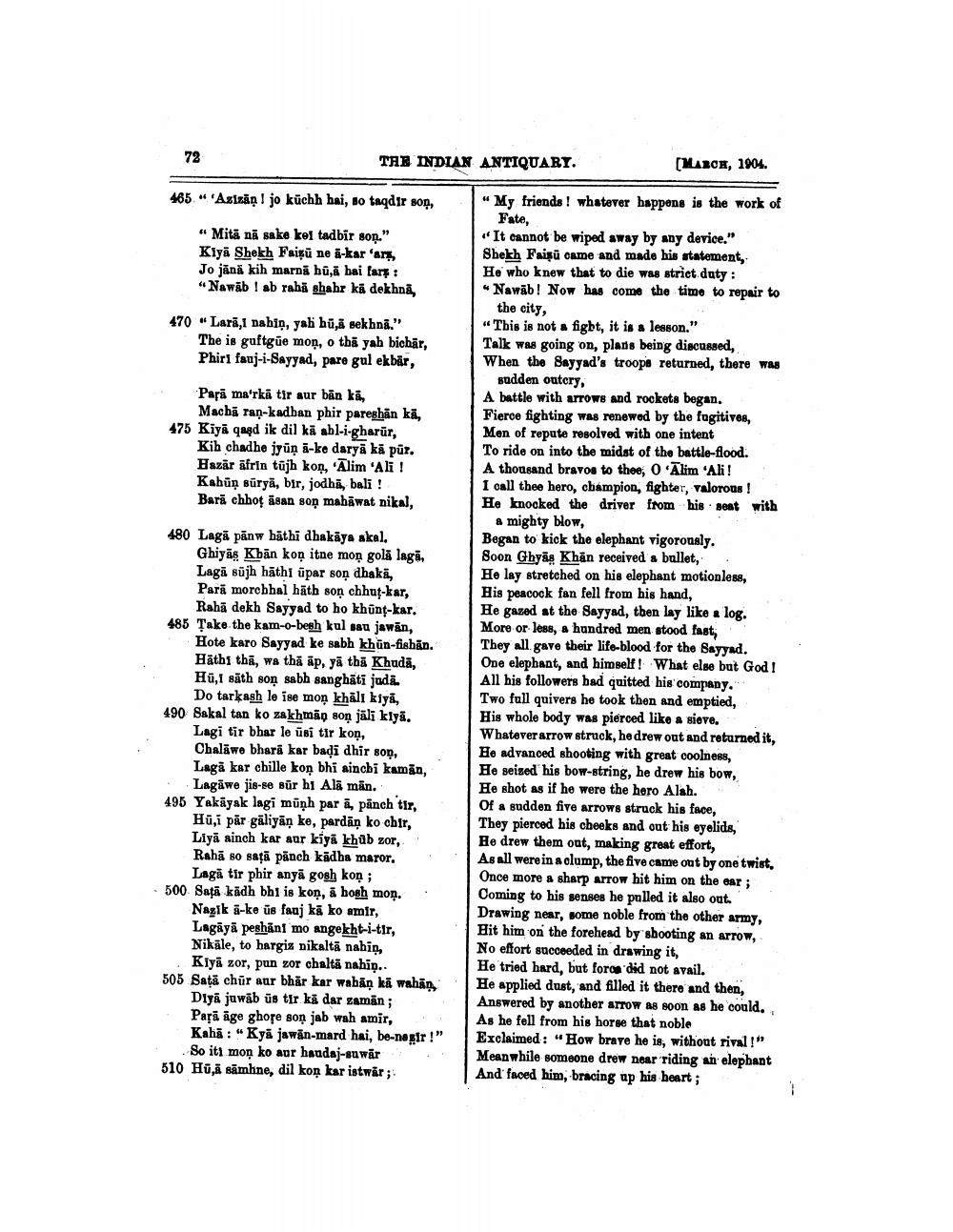________________
72
THE INDIAN ANTIQUARY.
465"Azizan! jo kuchh hai, so taqdir son,
"Mitā nā sake kei tadbir son." Kiya Shekh Faizu ne ā-kar 'ars, Jo jänä kih marnā bū‚ã hai farṛ: "Nawab ! ab raha shahr kā dekhnā,
470"Lara,i nahin, yah hu,ä sekhnā."
The is guftgue mon, o tha yah bichār, Phiri fauj-i-Sayyad, pare gul ekbär,
Para ma'rkā tir aur ban kā, Macha ran-kadban phir pareshan kā, 475 Kiya qaad ik dil ka abl-i-gharür,
Kih chadhe jyun ā-ke daryā kā pūr. Hazar äfrin tujh kon, 'Alim 'Ali! Kahun sürya, bir, jodha, bali! Bara chhot asan son mahāwat nikal,
480 Laga panw hathi dhakaya akal.
Ghiyas Khan kon itne mon gola laga, Laga süjh hathi upar son dhaka, Para morchhal hath son chhut-kar, Raha dekh Sayyad to ho khunt-kar. 485 Take the kam-o-besh kul sau jawan,
Hote karo Sayyad ke sabh khun-fishän. Hathi tha, wa thā āp, ya tha Khudā, Hü,1 sath son sabh sanghati juda. Do tarkash le ise mon khali kiya, 490 Sakal tan ko zakhman son jäli klyä. Lagi tir bhar le usi tir kon, Chalawe bhara kar badi dhir son, Laga kar chille kon bhi ainchi kaman, Lagawe jis-se sur hi Alā man.
495 Yakayak lagi mūņh par ā, panch tir, Hü,i par galiyan ke, pardan ko chir, Liya ainch kar aur kiya khub zor, Raha so sata panch kadha maror. Laga tir phir anya gosh kon; 500 Sata kadh bhi is kon, & hosh mon.
Nazik ā-ke us fauj kā ko amir, Lagaya peshani mo angekht-i-tir, Nikäle, to hargiz nikaltā nahin, Kiya zor, pun zor chalta nahin.. 505 Sata chur aur bhär kar wahan kā wahan, Diya jawab us tir kā dar zaman; Para age ghore son jab wah amir, Kaha: "Kya jawan-mard hai, be-negir!" So iti mon ko aur haudaj-suwar 510 Hu,a samhne, dil kon kar istwär;
[MARCH, 1904.
"My friends! whatever happens is the work of Fate,
"It cannot be wiped away by any device." Shekh Faisu came and made his statement, He who knew that to die was strict duty: "Nawab! Now has come the time to repair to the city,
"This is not a fight, it is a lesson." Talk was going on, plans being discussed, When the Sayyad's troops returned, there was sudden outcry,
A battle with arrows and rockets began. Fierce fighting was renewed by the fugitives, Men of repute resolved with one intent To ride on into the midst of the battle-flood. A thousand bravos to thee, O 'Alim 'Ali!
I call thee hero, champion, fighter, valorous ! He knocked the driver from his seat with a mighty blow,
Began to kick the elephant vigorously. Soon Ghyas Khan received a bullet, He lay stretched on his elephant motionless, His peacock fan fell from his hand, He gazed at the Sayyad, then lay like a log. More or less, a hundred men stood fast, They all gave their life-blood for the Sayyad. One elephant, and himself! What else but God! All his followers had quitted his company. Two full quivers he took then and emptied, His whole body was pierced like a sieve. Whatever arrow struck, he drew out and returned it, He advanced shooting with great coolness, He seized his bow-string, he drew his bow, He shot as if he were the hero Alah. Of a sudden five arrows struck his face, They pierced his cheeks and out his eyelids, He drew them out, making great effort,
As all were in a clump, the five came out by one twist, Once more a sharp arrow hit him on the ear; Coming to his senses he pulled it also out. Drawing near, some noble from the other army, Hit him on the forehead by shooting an arrow, No effort succeeded in drawing it,
He tried hard, but forca did not avail.
He applied dust, and filled it there and then, Answered by another arrow as soon as he could. As he fell from his horse that noble Exclaimed: "How brave he is, without rival!" Meanwhile someone drew near riding an elephant And faced him, bracing up his heart;




